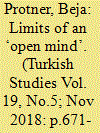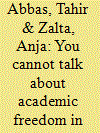| Srl | Item |
| 1 |
ID:
161142


|
|
|
|
|
| Summary/Abstract |
The history of Turkey, as experienced by its minority populations, is characterized by instances of demographic and topographic engineering, war, dispossession, and political violence. Rather than being single historical events, these are longue durée systematic processes of Turkification that have continuity with contemporary political arrangements and privileges, despite the fact that the notion of Turkishness has been continuously changing. This article reflects on ethnographic research and interviews with liberal Turkish university students in Istanbul about the Turkish–Kurdish conflict, conducted during a time of relative peace and political optimism. It discusses Turkish liberals’ silencing of state violence and denial of privilege constituted through violence. This ‘forgetting’ is conceptualized as a continuous investment in Turkishness, which involves complicity. Such analysis of belonging might help to explain today’s lack of political mobilization and solidarity between the Kurdish movement and opposition groups in the present time of growing political oppression.
|
|
|
|
|
|
|
|
|
|
|
|
|
|
|
|
| 2 |
ID:
156095


|
|
|
|
|
| Summary/Abstract |
In January 2016, 1128 predominantly Turkish intellectuals signed an Academics for Peace petition to draw attention to the conflict in southeastern Turkey. Their actions were met with outcry from the government, accusing the signatories of disloyalty to the state, even treason. This paper is an analysis of the responses of 60 of these scholars to a questionnaire sent to the entire Academics for Peace email list. Respondents, including 58 signatories, provided various perspectives on academic freedom in Turkey, as well as their own experiences of signing the petition. We contend that the responses faced by these intellectuals illustrate the homogenizing effects of power to silence criticism and ensure loyalty to the government and its ideas of Turkishness. It reflects a continuation of the suppression of academic freedom in Turkey, an issue that sees little sign of abatement or reform in the light of present challenges.
|
|
|
|
|
|
|
|
|
|
|
|
|
|
|
|